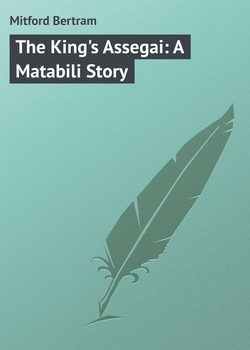Читать книгу The King's Assegai: A Matabili Story - Mitford Bertram - Страница 1
Prologue
Оглавление“You were astonished when I refused your piece of gold, Nkose. But were you to offer me your waggon loaded up with just such shining gold pieces, even that would not coax this broad spear out of my possession.”
(Nkose: literally “chief” – a title of civility which the innate courtesy of the Zulu moves him to bestow upon the stranger. In this connection it corresponds to “sir.”)
“I should be sorry to make the offer, Untúswa, for I fear that, whatever its merit, I should be the owner of a weapon for which I had paid too long a price.”
But the old Zulu only shook his head, contemptuously, it seemed, and the faint, satirical smile which turned down the corners of his mouth seemed to say, “This poor fool! Does he know what he is talking about?”
“Let me look at it again, Untúswa,” I said, reaching out for the weapon for which a few minutes before I had ended by offering a golden sovereign – having begun with a few worthless items of truck, such as beads, pocket-knives, etc. It was a splendid assegai of the short – handled, close-quarter type. The blade, double-edged, keen and shining, was three fingers broad and at least twenty inches in length, and was secured in its socket by raw-hide bindings, firm as iron, and most neatly and tastefully plaited. The haft, expanding at the butt into a truncated knob, was of a curious dark wood, something like ebony, almost black, and highly polished.
“Au! You are a good man, Nkose. You will not do anything to it?” was the somewhat reluctant reply, as the weapon was handed over.
“Bewitch it, I suppose you mean, Untúswa? Have no fear. There is no tagati about me – not a grain.”
Handling this splendid specimen of an assegai, poising it, noting its perfect and graceful make, its strength and temper, I was inclined to quadruple my original offer, but that I felt confident that the old man was in dead earnest as to his statement that untold gold would not induce him to part with this weapon. But here, I thought, is the direct antithesis of the Needy Knife-Grinder. This man has a story to tell, if only he can be induced to tell it.
The hour was propitious – the still, deliciously lazy time of the mid-day outspan. From our position on the Entonjaneni heights we commanded a fair expanse of the crag-crowned hills and rolling plains of Central Zululand. Beneath lay the wide bush-clad valley of the White Umfolosi – the river winding in a snaky band. Beyond, the Mahlabatini Plain – now silent and deserted – and there six great wizard-circles in the grass alone showed where had stood, a year or so back, just that number of huge kraals, the principal of which was Ulundi.
The unwilling dealer in prize assegais was a tall, thin old man, whose age it would have been impossible to guess were it not that by his own showing he must have been at least as old as the century – which would have given him fourscore. Though lean and shrunken, he showed evidences of the former possession of great muscular power, and even now was as straight as a telegraph-pole, and carried his ringed head slightly thrown back, as became a man who was somebody. He had come to the waggon, in company with other Zulus, to exchange civilities according to custom, but had lingered on after the departure of the rest. Then I fed him, and gave him much snuff, and strove to tempt him to sell the weapon which had taken my fancy.
“It is a fine spear,” I said, returning it to its owner; “but there are many such in Zululand, and of gold pieces there are not many. Why do you value it so?”
“Au! Value it?” Then, with a glance at my native boys who were snoring under the waggon, he said, in a lowered voice, and stretching forth his hand in emphasis:
“It was the spear of the King.”
“Of the King? Of Cetywayo?”
“Qa-bo! Not so!” he answered with a shake of the head. Then, after a few moments spent in snuff-taking and silence, he went on:
“Listen, Nkose; I have fought for another king than him whom you English have taken from us, and for whom our hearts are crying. Though in my old age I fought for Cetywayo as an ordinary warrior, yet I was, while yet young, a great induna at the right hand of another king, and the second in command of his armies. For my youth, and, indeed, most of my life, was passed among a kindred people who dwell to the north. I am from the Amandebili.”
(Amandebili: commonly known as Matabili.)
